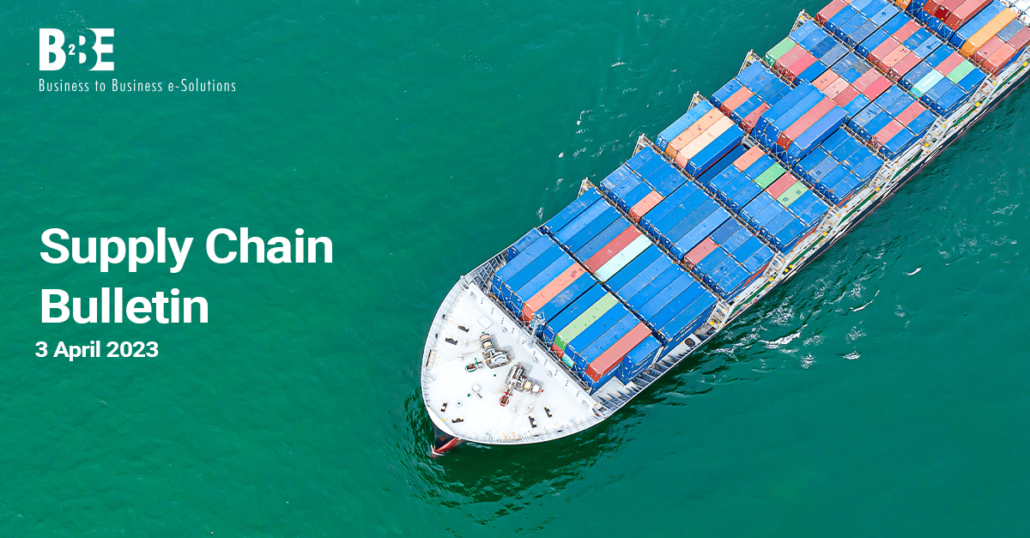This is your weekly supply chain bulletin from B2BE for the week starting 3rd April 2023.
Each week, we bring you a rundown of the latest trends in the news from across the supply chain industry. We cover the issues most important to you, bringing you useful links to the full articles. This ranges from news on various supply chain disruptions to strategies to lessen the damage. We also include other relevant supply chain related updates. If you missed it, you can read last week’s supply chain bulletin here. Read on to see what’s making the news this week.
Should Australia pursue “friend-shoring” to help with supply chain challenges?
The concept of “friend-shoring” refers to diversifying economic and strategic partnerships to reduce reliance on a single country like China. Australia can pursue friend-shoring by strengthening economic ties with countries like India, Indonesia, and Japan. As well as by deepening strategic relationships with traditional allies like the United States and the United Kingdom. There is need for Australia to develop its technological capabilities and therefore reduce its dependence on foreign technology. This article provides a roadmap for Australia to navigate the changing global order and reduce its economic and strategic risks by diversifying its partnerships.
Global shipping company Maersk withdraws from New Zealand ports
Global shipping company Maersk has decided to withdraw its coastal shipping service from New Zealand. The decision was made due to low demand for the service and ongoing operational challenges caused by the COVID-19 pandemic. The coastal service, which transported goods between New Zealand’s main ports, was launched by Maersk in 2017, but it faced stiff competition from local shipping companies. The article notes that the withdrawal of Maersk’s service could result in higher costs and reduced competition for domestic freight in New Zealand.
UK’s car output jumps by 13.1% as supply chain challenges ease
The UK’s car production in February 2023 increased by 13.1% compared to the same period last year, as supply chain issues caused by the COVID-19 pandemic began to ease. The Society of Motor Manufacturers and Traders (SMMT) attributed the increase to the resumption of production at many plants, following pandemic-related shutdowns. However, the article notes that the industry still faces challenges, such as a shortage of semiconductors and other components. The SMMT also warned that the ongoing COVID-19 pandemic and the risk of further lockdowns continue to pose a threat to the industry’s recovery.
Supply chain bottlenecks cause problems for wind power industry
Bottlenecks in the supply chain are causing significant delays and cost overruns in the wind power industry. Supply chain issues have caused delays of up to two years and increased costs by up to 50%. The main factors causing these issues are shortages of materials such as copper and steel, delays in shipping due to COVID-19-related restrictions, and a lack of skilled workers. The article suggests that the wind power industry needs to take urgent action to address these issues and avoid further delays and cost overruns. The industry could consider diversifying its supply chains. In addition to investing in local manufacturing, and collaborating with other industries to share resources and expertise.
À propos de B2BE
B2BE fournit des solutions électroniques pour la chaîne d'approvisionnement à l'échelle mondiale, aidant les organisations à mieux gérer leurs processus de chaîne d'approvisionnement, en fournissant des niveaux plus élevés de visibilité, d'auditabilité et de contrôle. Nous sommes animés par une passion pour ce que nous faisons, inspirés par l'innovation et soutenus par une richesse de connaissances. Avec plus de 20 ans d'expérience, les équipes de B2BE opèrent dans le monde entier.
Pour plus d'informations, visitez le site www.b2be.com.
